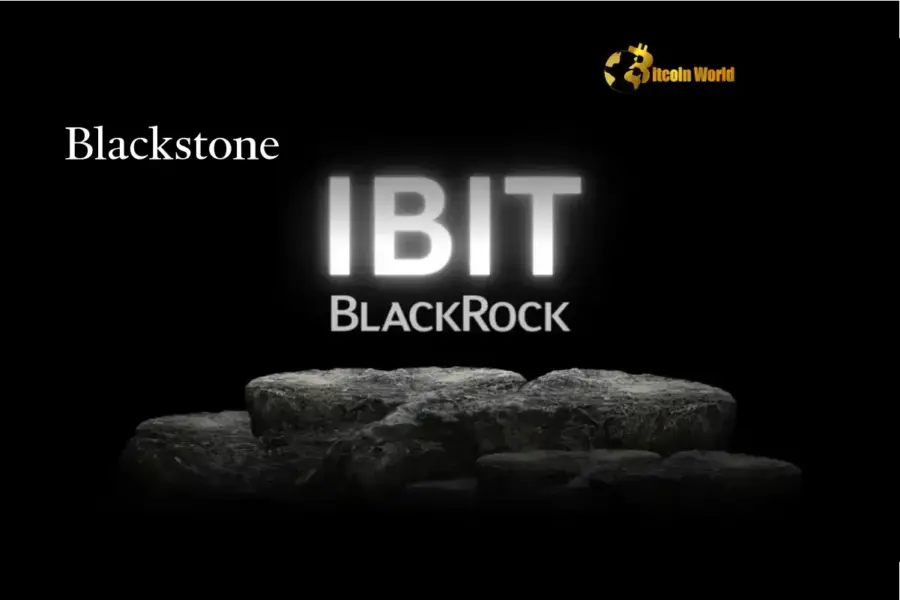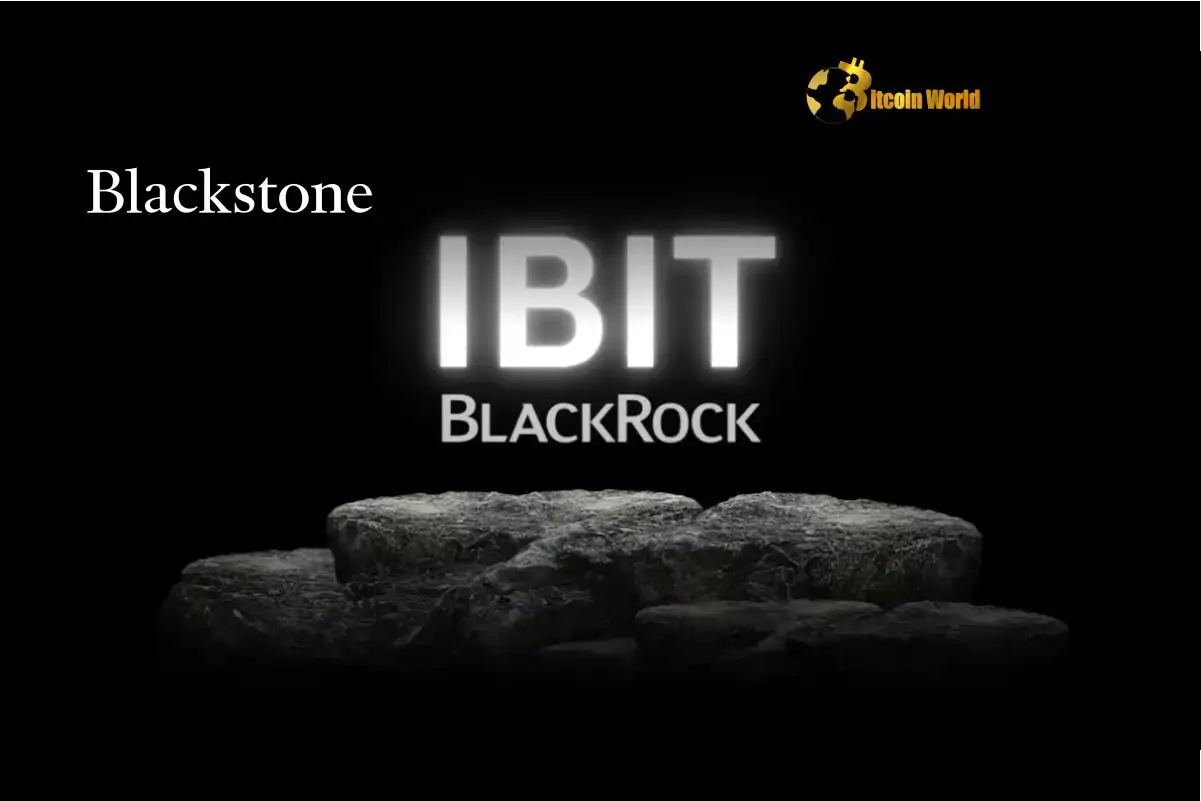Blackstone Makes Landmark Bitcoin Investment via IBIT ETF
0
0

BitcoinWorld

Blackstone Makes Landmark Bitcoin Investment via IBIT ETF
Get ready for some significant news from the world of finance and crypto! One of the biggest players in traditional finance has officially made its debut in the Bitcoin space. We’re talking about Blackstone, the world’s largest private equity firm. A recent public filing has revealed their first-ever disclosed position linked directly to Bitcoin, utilizing the popular iShares Bitcoin Trust (IBIT) ETF. This move is far more than just a footnote; it signals a deepening integration of cryptocurrencies into mainstream institutional portfolios.
Blackstone Bitcoin: What Does This Landmark Investment Signify?
When a firm the size and stature of Blackstone makes a move, the financial world pays attention. With trillions under management, their investment decisions often reflect broader market trends or even help shape them. The revelation that Blackstone’s Alternative Multi-Strategy Fund held a specific number of shares in the IBIT ETF as of March 31st is highly significant.
Why is this such a big deal? For years, Bitcoin was often viewed with skepticism by large, traditional financial institutions. While some early adopters emerged, the mainstream giants remained largely on the sidelines, citing concerns about volatility, regulation, and infrastructure. Blackstone’s public disclosure of a Blackstone Investment in a Bitcoin-linked product like IBIT is a strong indicator that these barriers are lowering and that major players are becoming increasingly comfortable allocating capital to digital assets.
This isn’t just about one firm; it’s about the signal it sends. It adds another layer of legitimacy to Bitcoin as an asset class in the eyes of conservative investors and could potentially encourage other large institutions to explore similar positions. It’s a clear step forward in the ongoing narrative of Institutional Bitcoin Investment.
Navigating Crypto Waters: Why the IBIT ETF?
It’s notable that Blackstone chose to gain exposure through an ETF, specifically BlackRock’s iShares Bitcoin Trust (IBIT). The approval of spot Bitcoin ETFs in the U.S. earlier this year was a watershed moment precisely because it provided regulated, accessible, and familiar investment vehicles for institutions and retail investors alike.
Here’s why an ETF like IBIT is often the preferred route for large firms:
- Ease of Access: ETFs trade on traditional stock exchanges, making them as easy to buy and sell as stocks. This avoids the complexities of dealing directly with cryptocurrency exchanges or managing private keys.
- Regulatory Clarity: U.S. spot Bitcoin ETFs are regulated products, operating under the oversight of the SEC. This provides a level of comfort and compliance that many institutions require.
- Familiar Structure: Portfolio managers are well-versed in trading and managing ETFs, which fit seamlessly into existing investment frameworks and reporting requirements.
- Custody Handled: The complexities and risks associated with storing Bitcoin are handled by the ETF provider and their custodians, removing a major operational hurdle for investors.
The fact that Blackstone opted for a Bitcoin ETF underscores the effectiveness of these products in bridging the gap between traditional finance and the crypto market.
The Filing Facts: Unpacking Blackstone’s Initial Bitcoin ETF Stake
According to the portfolio filing, Blackstone’s Alternative Multi-Strategy Fund held exactly 23,094 shares of the iShares Bitcoin Trust (IBIT) as of the end of the first quarter, March 31, 2024. This detail, initially highlighted by sources like Wu Blockchain on X, provides concrete evidence of the firm’s entry.
While 23,094 shares might seem like a specific number, it’s important to look at the value based on IBIT’s price at the time. As of March 31st, IBIT was trading around the high $30s to low $40s per share. This places the value of Blackstone’s initial stake in the low to mid-six figures. For a firm managing trillions, this is likely a relatively small, initial position – perhaps a test allocation or a strategic starting point rather than a massive immediate bet.
However, the size of the initial stake is less important than the fact that the investment was made and publicly disclosed at all. It marks a formal acknowledgment and adoption of a Bitcoin-linked asset within one of the world’s most influential investment firms.
The Broader Picture: Fueling Institutional Bitcoin Investment
Blackstone is not the only major financial player to reveal holdings in Bitcoin ETFs. Since their launch in January, these ETFs have seen significant inflows, driven largely by institutional and professional investors. Firms like Morgan Stanley, Wells Fargo, and various hedge funds and registered investment advisors (RIAs) have also disclosed positions in IBIT and other spot Bitcoin ETFs.
This collective movement represents a powerful trend. It suggests that financial advisors and portfolio managers are increasingly comfortable recommending or including Bitcoin exposure in client portfolios or their own funds. The approval and subsequent adoption of the Bitcoin ETF are democratizing access for large-scale investors who previously found direct crypto investment too complex or risky from a compliance standpoint.
The trend of Institutional Bitcoin Investment is seen by many as a crucial factor for Bitcoin’s long-term price stability and growth. As more traditional capital enters the market through regulated products, it can provide a more stable demand base compared to purely retail-driven cycles.
What’s Next? Implications of the Blackstone Investment
Blackstone’s entry, while initially modest in size relative to their total assets, could have several implications:
- Increased Confidence: It provides further validation for Bitcoin as a legitimate asset class, potentially encouraging other hesitant institutions.
- Potential for Growth: If this initial stake is successful or proves strategic, Blackstone could increase its allocation over time, as could other firms following their lead.
- Market Sentiment: News of major players like Blackstone entering the market often boosts positive sentiment among investors.
- Focus on ETFs: It reinforces the role of spot Bitcoin ETFs as the primary gateway for large-scale traditional finance entry into crypto.
While the immediate price impact of this specific filing might be limited given the stake’s size, the long-term implication of major firms like Blackstone adding Blackstone Bitcoin exposure to their portfolios is overwhelmingly positive for the crypto market’s maturity and acceptance.
It’s a reminder that the convergence of traditional finance and cryptocurrency is accelerating, driven by accessible products like the IBIT ETF and the increasing recognition of Bitcoin’s unique value proposition.
Conclusion:
Blackstone’s disclosure of its Blackstone Investment in the IBIT ETF is a significant development in the ongoing story of institutional adoption of Bitcoin. As the world’s largest private equity firm, their entry, even with an initial smaller stake, sends a powerful message about the growing acceptance and integration of digital assets into mainstream finance. This move, facilitated by the accessibility of the Bitcoin ETF, highlights the increasing comfort level of major players with the asset class and further solidifies the trend of Institutional Bitcoin Investment. It’s another landmark step in Bitcoin’s journey from a niche technology to a recognized and investable asset.
To learn more about the latest Bitcoin and institutional adoption trends, explore our articles on key developments shaping Bitcoin’s price action and future outlook.
This post Blackstone Makes Landmark Bitcoin Investment via IBIT ETF first appeared on BitcoinWorld and is written by Editorial Team
0
0
 Manage all your crypto, NFT and DeFi from one place
Manage all your crypto, NFT and DeFi from one placeSecurely connect the portfolio you’re using to start.





